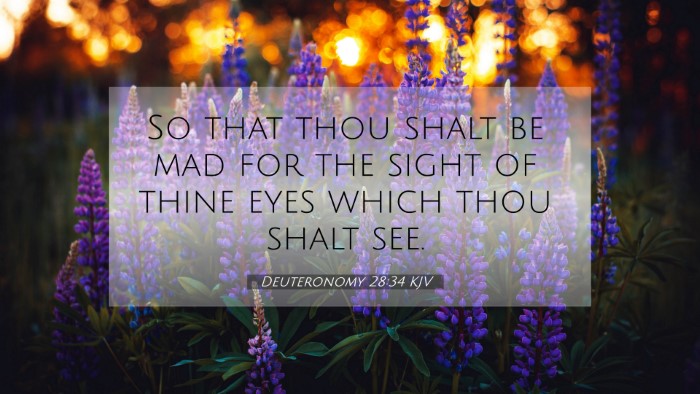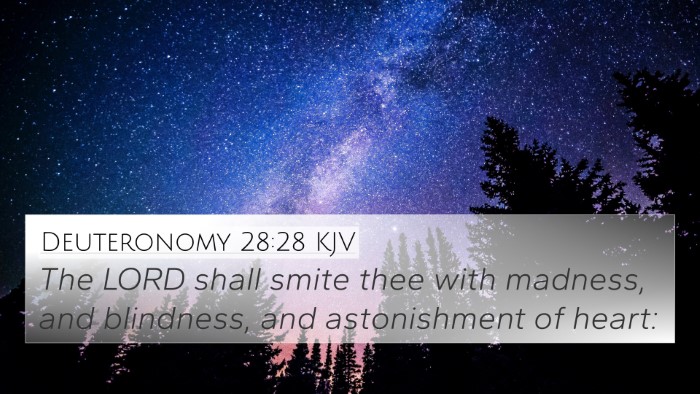Understanding Deuteronomy 28:34
Verse Context:
Deuteronomy 28:34 states, "So that thou shalt be mad for the sight of thine eyes which thou shalt see." This verse falls within a larger context where Moses discusses the blessings and curses that would come upon the Israelites depending on their obedience to God's commandments.
General Interpretation:
This verse conveys a profound sense of despair and madness resulting from the catastrophic events that God foretells as consequences of disobedience. The sight of their calamity and misfortune—a direct consequence of turning away from God's commandments—leads to a condition of madness, indicating extreme emotional and mental turmoil.
Commentary Insights
- Matthew Henry: He emphasizes the gravity of God's warnings and the seriousness with which the people should heed these admonitions. The verse serves as a dire consequence of unfaithfulness to God's covenant. The madness referenced is a result of unendurable sorrow and shame for what they witness as their fate.
- Albert Barnes: Barnes notes that the intense feelings resulting from observing such calamities can be so overwhelming that they push individuals to a state of insanity. He interprets the madness not just as a literal derangement but also as a state of extreme anguish leading to a loss of reason due to the heavy burden of divine judgment.
- Adam Clarke: Clarke elaborates on the metaphorical implications, suggesting that the madness refers to an inability to comprehend the gravity of their circumstances. He connects the verse to similar expressions of despair found throughout scripture, explaining that people often react irrationally in the face of tragic experiences that stem from their failures to obey God.
Cross-References
Deuteronomy 28:34 relates to several other scriptures that either reinforce its message or present parallel teachings:
- Deuteronomy 28:15 - This verse lays the foundation for understanding the curses that can result from disobedience, providing context for the subsequent verses.
- Leviticus 26:36-37 - These verses discuss the fear that Israel would experience due to the repercussions of their unfaithfulness.
- 1 Samuel 28:20 - The madness and fear in this passage reflect similar themes of despair in the face of divine judgment.
- Jeremiah 29:16-17 - These verses further enumerate the calamities that would befall those who disobey God, resonating with the despair depicted in Deuteronomy 28:34.
- Ezekiel 18:30 - This verse emphasizes repentance to avoid the dire consequences that lead to madness and suffering.
- Matthew 24:19 - In this passage, Jesus refers to the dire consequences of disobedience, highlighting the extent of suffering and despair.
- Revelation 7:14 - This verse provides a contrast to the madness of despair, leading instead to salvation and redemption.
- Proverbs 1:24-27 - These verses illustrate the chaining consequences of ignoring godly wisdom, akin to the despair in Deuteronomy 28:34.
- Isaiah 33:18 - This verse highlights the fear and anxiety stemming from witnessing the judgment upon those who have disregarded God.
- Galatians 6:7-8 - A new covenant twist on the law of reaping what one sows, reinforcing the consequences of disobedience seen in the Old Testament.
Thematic Connections
Deuteronomy 28:34 can be understood within various thematic frameworks of scripture:
- **Judgment**: A theme prominent throughout the Bible, highlighting God's justice.
- **Disobedience**: Illustrating the consequences of straying from God's ways, as seen in many Biblical narratives.
- **Despair**: Exploring the human experience of suffering resulting from divine retribution.
- **Divine Sovereignty**: Recognizing God's control over history, actions, and consequences.
Conclusion
In summary, Deuteronomy 28:34 serves as a sobering reminder of the consequences associated with disobedience to God. The insights from various commentaries point to the deep emotional and spiritual ramifications arising from witnessing the results of turning away from divine guidance. Cross-referencing this passage with other scriptural texts creates a broader understanding of its implications and the vital importance of faithfulness to God's commandments.
Tools for Bible Cross-Referencing
For those seeking to delve deeper into the connections between Bible verses, several tools can aid in this endeavor:
- Bible Concordance
- Bible Cross-Reference Guide
- Cross-Reference Bible Study Methods
- Comprehensive Bible Cross-Reference Materials
- How to Use Bible Cross-References







